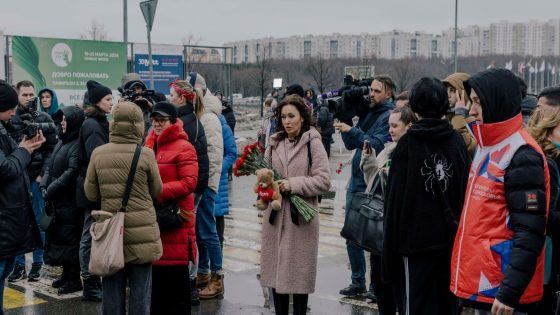As Russia mourned the victims of the worst terrorist attack in the Moscow area in more than two decades on Sunday, differing narratives about the attack were spreading and taking hold in the country.
The attack late Friday on a concert hall near Moscow left at least 137 people dead and represented a significant security failure for the Kremlin. While the Russian authorities said they had arrested the four attackers, speculation over their identities and motivations was widespread. There also were open questions about whether Russia had adequately followed up on a warning from the United States about the threat of such an attack, and about how specific that warning was.
But most Russian commentators and state media devoted little time to those issues, instead pointing fingers elsewhere. The reaction reflected in part the state of anxiety that Russia has been living in since the start of the war in Ukraine, with propaganda outlets competing to advance one narrative, conspiracy theory or bit of speculation after another.
Many nationalist commentators and ultraconservative hawks on Sunday continued to push the idea that Ukraine was the obvious culprit, despite a claim of responsibility and mounting evidence that a branch of the Islamic State was responsible.
Hard-line anti-Kremlin activists speaking from abroad, meanwhile, speculated that the Russian state could have orchestrated the attack so that it could blame Ukraine or further tighten the screws inside the country.
Some lawmakers in Parliament argued that the government needed to get tough on migrants, after the authorities said that the four assailants were foreign citizens. Lawmakers also pledged to discuss whether capital punishment should be introduced in Russia.
“Different political forces are starting to use” the attack, said Aleksei Venediktov, a Russian journalist and commentator and the former editor of the influential Ekho Moskvy radio station. “The Kremlin, most of all,” he said in an interview broadcast on YouTube. “But others too, who say that it was all organized by the Kremlin.”
Some nationalist activists said that such a sense of disorientation could have been the attackers’ ultimate goal.
Yegor S. Kholmogorov, a Russian nationalist commentator, wrote in his blog on the Telegram messaging app that Russian society was “strongly united by the war and President Vladimir V. Putin’s victory in the election” before the attack.
But after the tragedy, he lamented on Sunday, Russia had turned into a “society that is split.”
Mr. Putin has done little to clear things up. On Saturday, he vowed to inflict “fair and inevitable” punishment on both the terrorists and the unknown forces behind them. Mr. Putin hinted that Ukraine was tied to the tragedy but stopped short of directly laying blame.
But many of Mr. Putin’s subordinates and public supporters appeared to have made up their minds about who was responsible.
Sergei A. Markov, a pro-Kremlin analyst who often appears on Russian state television, wrote in a post on Telegram that Russia must work at isolating the Ukrainian leadership by “connecting the terrorist act not with ISIS, but with the Ukrainian government as much as possible.”
Russian state news outlets barely mentioned the claim of responsibility made by a branch of ISIS. United States officials have said the atrocity was the work of Islamic State Khorasan, or ISIS-K, an offshoot of the group that has been active in Pakistan, Afghanistan and Iran.
Maria V. Zakharova, a spokeswoman for the Russian Foreign Ministry, said on Sunday that the West was pointing at ISIS in order to shift the blame away from Ukraine.
Russia has not presented any evidence of Ukraine’s involvement in the attack. Ukrainian officials have ridiculed the Russian accusations, and U.S. officials also have said there is no indication Kyiv played any role.
“There is no, whatsoever, any evidence — and, in fact, what we know to be the case is that ISIS-K is actually by all accounts responsible for what happened,” Vice President Kamala Harris said Sunday when asked on ABC’s “This Week” whether the United States had evidence that Ukraine was connected to the concert hall attack.
Some commentators did criticize Russian security services for failing to prevent the tragedy. On Saturday, the state news agency Tass reported, citing a source in the Russian special services, that they had received a warning from the United States but that it was “broad, without any concrete information.”
Source Agencies


